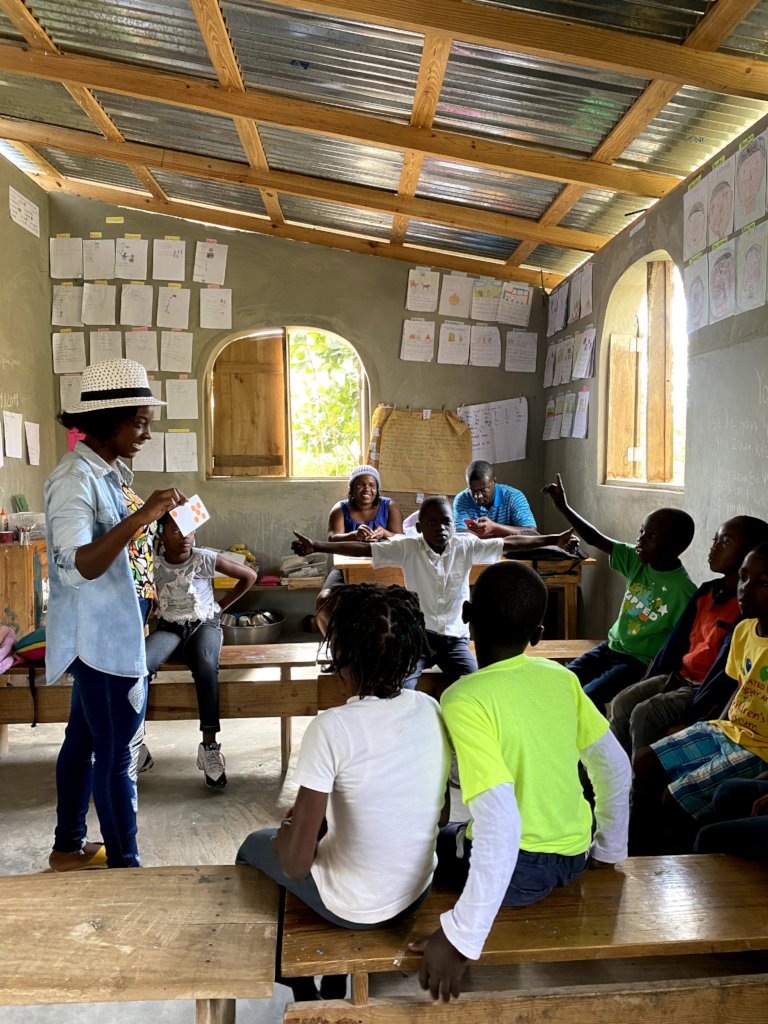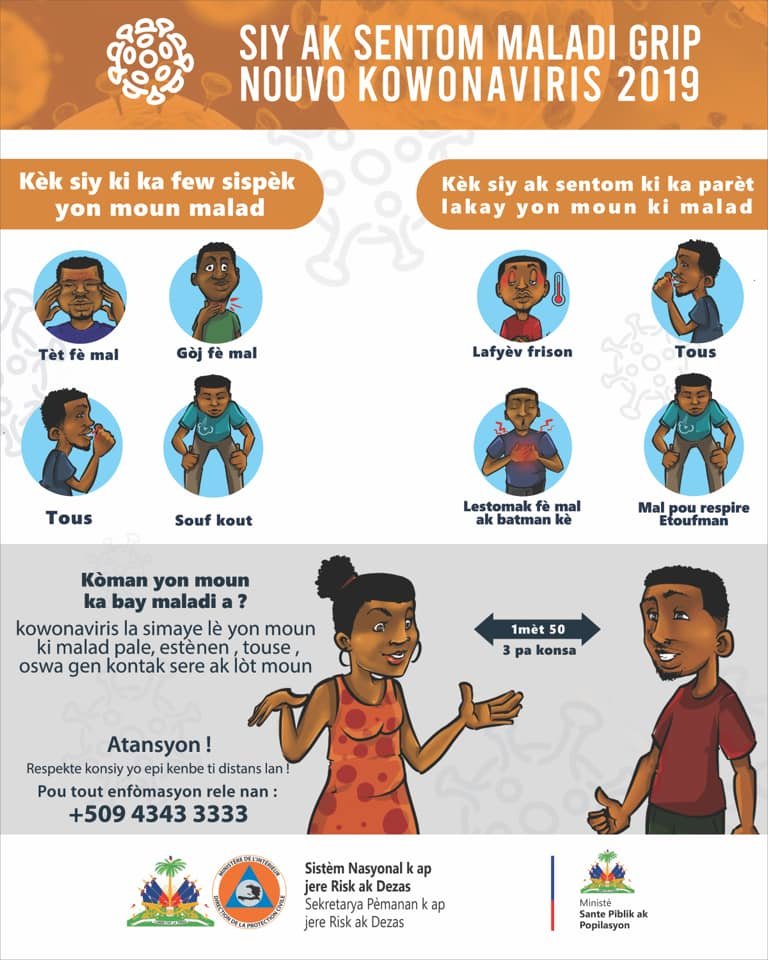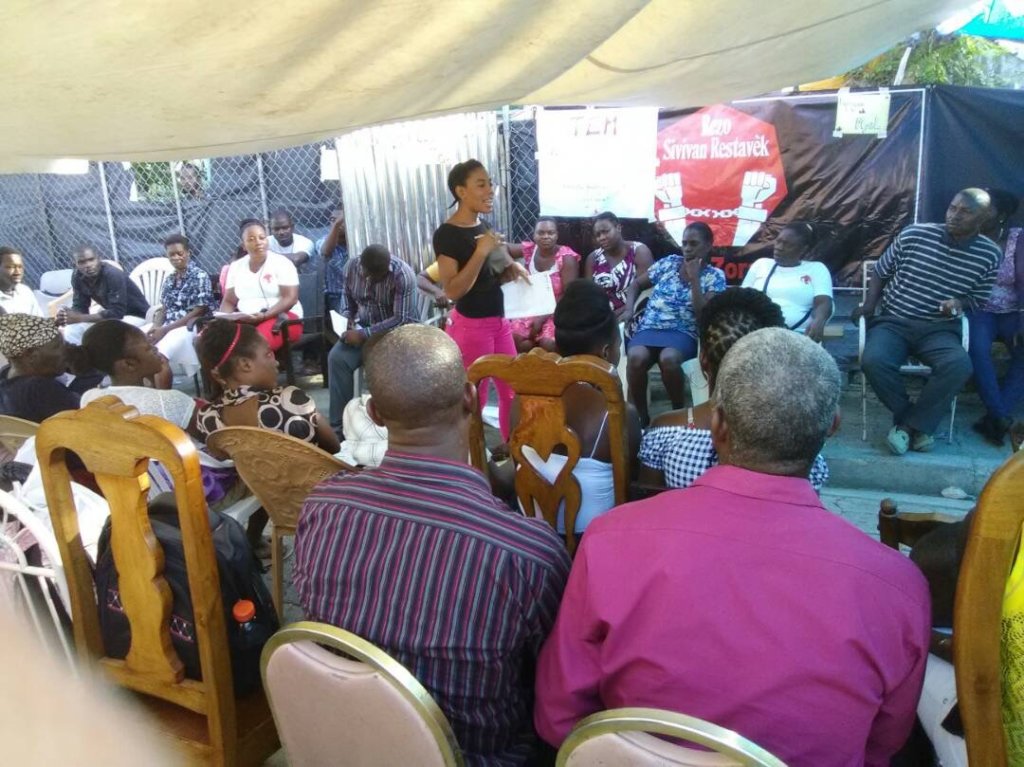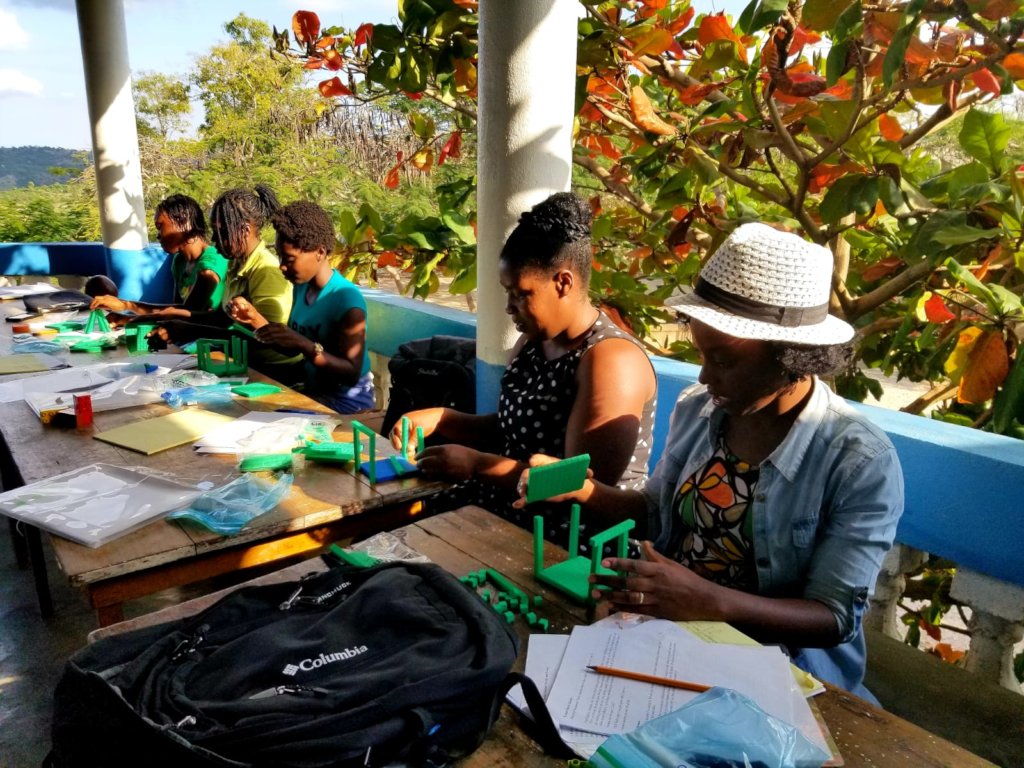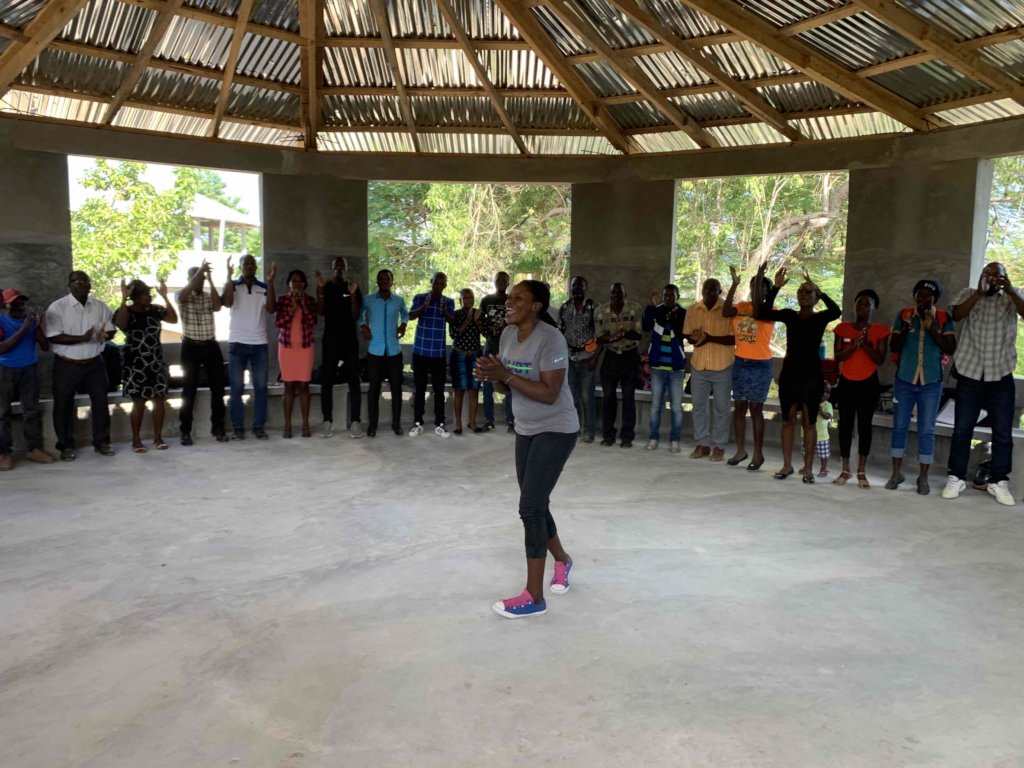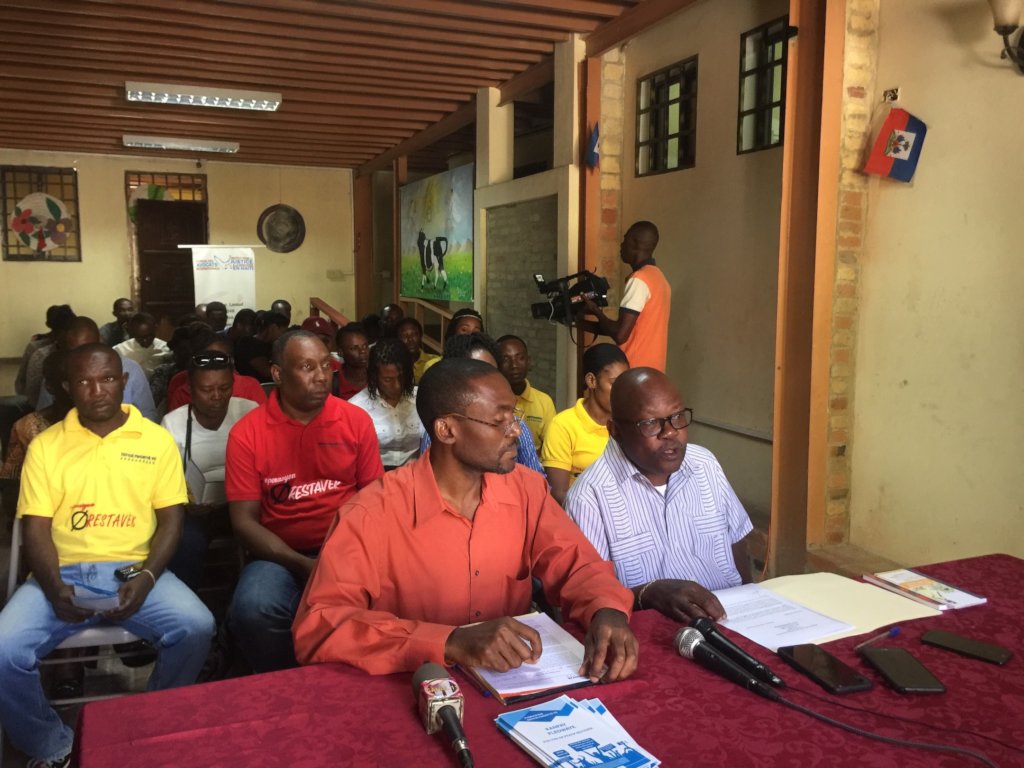By Brian Stevens | Donor Engagement Director
How We are Preparing for the Coronavirus
Before I share with you the latest update on the work that you are making possible through your generous support, I want to share with you a message from our Executive Director David Diggs about the actions that we are taking now to help people in Haiti prepare for COVID-19 (coronavirus).
While we are unaware of any confirmed cases in Haiti at this point, we have little confidence that anyone with symptoms would be able to find a place in Haiti where they could be tested.
That is why we are acting now to reduce the risk of transmission among our staff and the populations we serve.
As you know, much of our work happens in gatherings of grassroots leaders, parents, teachers, local elected officials, and people from all walks of life.
They come together to share, to learn, and to leverage their collective power to ensure that their communities are free of child slavery and violence against women, that every child goes to a good school, and that dignified work feeds the souls and bodies of each and every one of their neighbors.
Doing this in the age of the coronavirus will be challenging, to be sure.
We are committed to working with communities to implement measures designed to prevent the spread of the virus just as we did during the deadly cholera outbreak that began in October 2010.
As we did then, we will promote safe handwashing and other preventative practices at all of our trainings, offices, and gatherings of any kind.
We’ve installed handwashing stations at each of these locations, and we are requiring all visitors to our offices and participants at our meetings and trainings to wash their hands according to the guidelines issued by the U.S. Centers for Disease Control.
We are also copying and distributing widely a Creole-language poster with instructions on preventing the spread of coronavirus developed by Haiti’s Ministry of Health.
Additionally we are supplying hand sanitizer to all of our offices and to our staff members to carry with them in the field, and we’ve begun using bleach to wipe down frequently touched surfaces like door handles and chairs.
We have also suspended all donor delegations and international travel to Haiti through April.
Given the rapid pace at which the coronavirus is spreading globally, we will be constantly re-evaluating these measures to determine their effectiveness, and we are prepared to follow any orders issued by the Ministry of Health -- including the cancellation of trainings and meetings as warranted.
While COVID-19 can infect anyone regardless of their wealth, race, or national origin, people in Haiti face extra risks. Widespread hunger leaves the poorest more vulnerable to infection, and health systems -- where they do exist -- are already stretched extremely thin. In much of rural Haiti there is essentially no health system at all.
What Haiti is rich in is solidarity among neighbors who often make stunningly generous sacrifices for one another. As the world begins practicing and encouraging social distancing to slow the spread of this virus, we would all do well to draw courage from our neighbors in Haiti who have learned through many hardships the supreme value of solidarity.
David Diggs, Co-Founder and Director
Your Generosity is Building the Movement to End Child Slavery
Thank you again for your generous support for Beyond Borders’ Schools Not Slavery Project on GlobalGiving. We are grateful for your generosity and your solidarity!
You are making so many good things possible for vulnerable children in Haiti. With your support, our team carried out activities that included:
You are Supporting the Development of a Protocol for the Prevention of Child Human Trafficking on Lagonav
Your generosity is also supporting work with the Mayor of the commune of Ansagale, on Lagonav Island, to develop a protocol aimed at preventing trafficking of children. During a two-day workshop, the Mayor, his cabinet, and elected officials from five municipal districts along with the Beyond Borders team worked together on the protocol, which includes
The locally elected officials have the responsibility to organize and facilitate community discussions on the draft protocol in their respective communities in order to make changes where necessary.
At the end of the process, the Mayor will issue a municipality decree in June 2020 on the occasion of the World Day Against Child Labor.
You are Supporting Capacity Development Work with the Adult Survivor Network
A key component of the Adult Survivor Network strategy is to continue to support the capacity development of each branch – individually and collectively. Your generous support makes this work possible.
Thanks to your support, the Beyond Borders team adapted an organizational maturity assessment tool and conducted an initial diagnostic of six branches of the survivor networks.
The tool assesses the following dimension of an organization: strategic leadership, organizational structure, human resources, relationship with other organizations, program and services management, and organizational process.
The results of the assessment were quite low, with overall scores ranging from 21 out of 120 to 57 out of 120. A structure is considered well-established when it is in the range 81-120. As a result of this assessment, plans are being made to invest in the capacity of each branch.
Despite the low assessment numbers, we found it extremely encouraging to learn how the Adult Survivor Network Coordination and eight urban branches organized and coordinated to commemorate the National Day to End the Practice of Restavèk on November 17th without any significant support from Beyond Borders’ staff.
A press conference was organized (and well-attended by local media) and all eight branches conducted a series of activities in their respective communities, ranging from conference-debates to door-to-door conversations. This clearly demonstrates the motivation and leadership within the network’s Coordination body and the individual branches.
Your generous support also made the following trainings possible:
You are Building the Movement to Guarantee Universal Access to Quality Education
Thanks to you and your generosity, Beyond Borders continues to work with and support local government representatives of the Ministry of Education to develop and roll out a new strategy to build and strengthen the movement to ensure access to quality primary education to all children living on Lagonav Island.
We also continue working in partnership with the Matènwa Community Learning Center (MCLC) to support work with 23 schools (18 new this year) to strengthen the quality of education through native language instruction, a participatory approach to classroom instruction, nonviolent classroom management, the use of parental engagement strategies, and education rooted in rural life including teaching through school gardens and crop management.
The Engagement with Local Authorities that Your Support Makes Possible
Because of your generous support, initial meetings were organized in all six municipal districts to hold Open Space Dialogue sessions with school teachers, school directors and communities to discuss issues and challenges affecting access to quality education for all children on Lagonav.
Together participants identified the problems, analyzed the causes and explored possible solutions. Follow up meetings with each school in each district and specific outreach to government-appointed school inspectors are part of the plans moving forward.
Beyond Borders is very encouraged by the engagement and political will of many of the authorities and communities as they begin looking at systematic ways to address identified problems and possible solutions.
This Year’s Teacher-Training Program is Fully Underway - Thanks to You
At the 18 new schools and five ongoing schools participating in the teacher training program, this year’s training is fully underway. Here’s a look at some of the types of training that your support is making possible at these 23 schools for teachers and parents:
Thank You Again
Thank you again for your generosity, your care, and your concern for children in Haiti. I wish I could tell you what will happen when COVID-19 reaches Haiti. While we continue to closely follow the guidance of public health professionals, no one knows for sure.
Whatever the impact, the only certainty is, it will be even greater for those living on the margins: Haiti’s enslaved children, women and girls caught in domestic violence, families mired in the most extreme poverty.
As Haiti braces for the full impact of the coronavirus, the people we work with today need us to continue to accompany them, to empower them, to stand alongside them -- to keep the faith with them.
Your generous support for Schools Not Slavery is the very best way that you can continue to be there for them -- to keep the faith with them.
If you have any questions about what you read in this report, please don’t hesitate to call or email me at (305) 450-2561 or b.stevens@beyondborders.net.
With deep gratitude,
Brian Stevens, Donor Engagement Director
Links:
By Brian Stevens | Donor Engagement Director
By Brian Stevens | Donor Engagement Director
Project reports on GlobalGiving are posted directly to globalgiving.org by Project Leaders as they are completed, generally every 3-4 months. To protect the integrity of these documents, GlobalGiving does not alter them; therefore you may find some language or formatting issues.
If you donate to this project or have donated to this project, you can receive an email when this project posts a report. You can also subscribe for reports without donating.
Support this important cause by creating a personalized fundraising page.
Start a Fundraiser